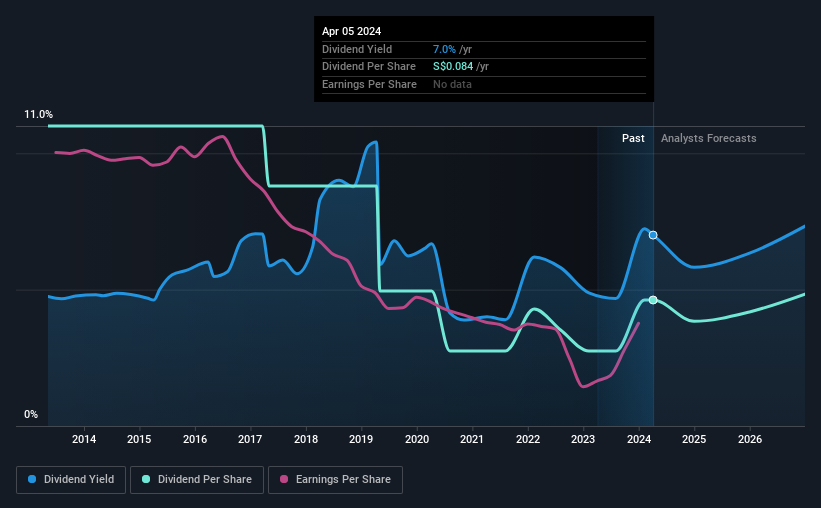StarHub (SGX:CC3) Is Paying Out A Larger Dividend Than Last Year
The board of StarHub Ltd (SGX:CC3) has announced that it will be paying its dividend of SGD0.042 on the 16th of May, an increased payment from last year's comparable dividend. This makes the dividend yield 7.0%, which is above the industry average.
See our latest analysis for StarHub
StarHub's Dividend Is Well Covered By Earnings
If the payments aren't sustainable, a high yield for a few years won't matter that much. Before this announcement, StarHub was paying out 82% of earnings, but a comparatively small 74% of free cash flows. Since the dividend is just paying out cash to shareholders, we care more about the cash payout ratio from which we can see plenty is being left over for reinvestment in the business.
Over the next year, EPS is forecast to expand by 30.8%. If the dividend continues along recent trends, we estimate the payout ratio will be 53%, which would make us comfortable with the sustainability of the dividend, despite the levels currently being quite high.
Dividend Volatility
Although the company has a long dividend history, it has been cut at least once in the last 10 years. The dividend has gone from an annual total of SGD0.20 in 2014 to the most recent total annual payment of SGD0.084. Doing the maths, this is a decline of about 8.3% per year. Generally, we don't like to see a dividend that has been declining over time as this can degrade shareholders' returns and indicate that the company may be running into problems.
Dividend Growth Is Doubtful
Given that the track record hasn't been stellar, we really want to see earnings per share growing over time. StarHub has seen earnings per share falling at 5.9% per year over the last five years. Declining earnings will inevitably lead to the company paying a lower dividend in line with lower profits. Earnings are predicted to grow over the next year, but we would remain cautious until a track record of earnings growth is established.
Our Thoughts On StarHub's Dividend
Overall, we always like to see the dividend being raised, but we don't think StarHub will make a great income stock. In the past, the payments have been unstable, but over the short term the dividend could be reliable, with the company generating enough cash to cover it. This company is not in the top tier of income providing stocks.
Companies possessing a stable dividend policy will likely enjoy greater investor interest than those suffering from a more inconsistent approach. Meanwhile, despite the importance of dividend payments, they are not the only factors our readers should know when assessing a company. For instance, we've picked out 2 warning signs for StarHub that investors should take into consideration. Is StarHub not quite the opportunity you were looking for? Why not check out our selection of top dividend stocks.
Have feedback on this article? Concerned about the content? Get in touch with us directly. Alternatively, email editorial-team (at) simplywallst.com.
This article by Simply Wall St is general in nature. We provide commentary based on historical data and analyst forecasts only using an unbiased methodology and our articles are not intended to be financial advice. It does not constitute a recommendation to buy or sell any stock, and does not take account of your objectives, or your financial situation. We aim to bring you long-term focused analysis driven by fundamental data. Note that our analysis may not factor in the latest price-sensitive company announcements or qualitative material. Simply Wall St has no position in any stocks mentioned.

 Yahoo Finance
Yahoo Finance 
